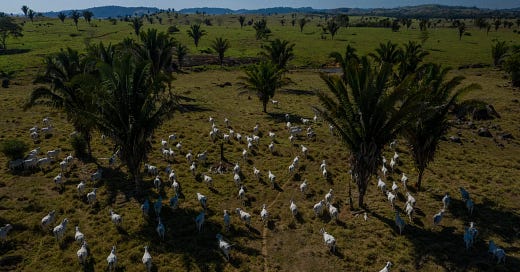This might be a tipping point for greenwashing
New York is suing the world's largest meat company.
Happy post-eclipse, to those on the parts of the globe in its path. I stepped out for a bit yesterday afternoon to stare at the sky alongside many of my fellow New Yorkers against a backdrop of blooming magnolia trees and neighborly chatter. The whole experience made me think about our universe, and the fact that without ever stepping foot in a rocket ship, we’re all, already, in space. What a gift that of all the planets out there, we get to call this extraordinary little dot our home.
Now to the news about what’s going on down here on the surface of the Earth:
New York is suing the world’s biggest meat company. It might be a tipping point for greenwashing
I have been covering greenwashing in one industry or another since the start of my career. So when experts began to tell me that we might be looking at a tipping point in the form of New York attorney general Letitia James’s lawsuit against the world’s largest meat company, JBS, for misleading customers about its climate commitments, I sat up and paid attention. “It’s been 20 years of companies lying about their environmental and climate justice impacts. And it feels like all of a sudden, from Europe to the US, the crackdown is beginning to happen,” Todd Paglia, executive director of environmental non-profit Stand.earth, told me.
(And as a newsletter subscriber, let me give you a funny little behind-the-scenes anecdote: one of the moments specifically cited in the legal complaint came from JBS CEO’s statements at the New York Times climate summit last September, when he admitted openly that JBS does not know how to calculate its own emissions [much less mitigate them]. I happened to be sitting in that audience one row behind Robin Wall Kimmerer, author of Braiding Sweetgrass, and saw her become visibly disturbed by what was being said onstage. Fascinating to see the company taken to court just a few months later for those same statements.)
‘They kept us alive for thousands of years’: could saving Palestinian seeds also save the world?
Vivien Sansour started the Palestinian Heirloom Seed Library project to safeguard Palestinian culture and foodways — but also for the sake of a world that needs all the biodiversity possible to adapt to a changing climate, and which could perhaps benefit from the drought-resistant seeds that Palestinians have cultivated over generations. Her project has come to feel even more poignant against the backdrop of man-made famine and starvation in Gaza. “Seed stories are multi-layered; not all of the stories are as romantic as many people would like,” one Sansour collaborator told me. “The Palestine Heirloom Seed Library offers everyone a resolve to not shy away, but instead to find ways to share both the aspirational and the challenging stories that seeds carry.”
Bats are in trouble. That’s not good for anyone who likes mezcal, rice or avocado
Bats play a crucial role in human food systems by eating insects (in the US, bats save farmers $3 billion a year by helping them avoid crop damage and pesticide use), pollinating plants (much like bees) and dispersing seeds. But they’re in trouble due to habitat destruction, disease and climate change — which is bad news if you enjoy coffee, tomatoes, corn, bananas, mangoes, walnuts, chocolate, tequila or mezcal. This story highlights what’s wrong, and what we can do about it. Bat box, anyone?
In non-reporting news, I organized and moderated a dream panel on public transit and micromobility — aka buses, trains, walking, biking and more — at the Society of Environmental Journalists (SEJ) conference last week, as part of a larger workshop on decarbonizing transit. And I appeared as a guest on the Supersede podcast to talk about the crucial importance of journalism, especially from a climate perspective.
I’ll leave you with “We Have Not Long to Love” by Tennessee Williams, with all the tenderness and loss of the poem woven right into the title. “Light does not stay,” Williams tells us; neither do eclipses, no matter how extraordinary. What better to do than to treasure them while they’re in front of of us?
Wishing you intimate silences and moments of staring at the sky,
Whitney





